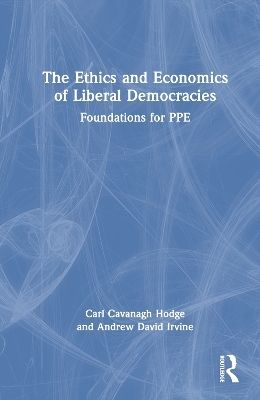
The Ethics and Economics of Liberal Democracies
Foundations for PPE
Seiten
2024
Routledge (Verlag)
978-1-032-73009-7 (ISBN)
Routledge (Verlag)
978-1-032-73009-7 (ISBN)
The Ethics and Economics of Liberal Democracies gives students in philosophy, politics and economics (PPE) a primer on the basic values of modern, Western, liberal democracy, as well as on free and fair elections, human rights, the rule of law, civil society and the free market.
Rarely in the short history of liberal-democratic government has a primer on basic liberal-democratic values and institutions been more needed than now. Popular discontent, even anger, with democratic governments has grown steadily over the past twenty years. Not since the 1930s have citizens and their elected officials been so baffled about their respective roles in the maintenance of both democratic governments and liberal economies.
This book attempts to address this growing need. Especially written as a primer for courses in Philosophy, Politics and Economics (PPE), it has introductory chapters on all three main disciplines. It also has chapters on the rule of law and on three important public-policy areas – Corruption, Climate and Civil Society. Individual topics discussed include free and fair elections, populism, responsible government, republican and Westminster systems of government, regulated free markets, the Great Recession of 2008, globalization, greenwashing, identity politics, academic freedom, utilitarianism, social contract theory, positive and negative liberty, and the good life.
Historically informed, The Ethics and Economics of Liberal Democracies: Foundations for PPE is sure to be of interest to students who are interested in public-policy work, as well as those who are interested in both the theory and practice of democratic government.
Key Features:
Written especially for PPE (Philosophy, Politics and Economics) courses and students
Focuses on the key values and institutions of modern democracies
Includes chapters on both the theory and practice of democratic government and public-policy work
Provides a comprehensive glossary of relevant terms from all three disciplines
Rarely in the short history of liberal-democratic government has a primer on basic liberal-democratic values and institutions been more needed than now. Popular discontent, even anger, with democratic governments has grown steadily over the past twenty years. Not since the 1930s have citizens and their elected officials been so baffled about their respective roles in the maintenance of both democratic governments and liberal economies.
This book attempts to address this growing need. Especially written as a primer for courses in Philosophy, Politics and Economics (PPE), it has introductory chapters on all three main disciplines. It also has chapters on the rule of law and on three important public-policy areas – Corruption, Climate and Civil Society. Individual topics discussed include free and fair elections, populism, responsible government, republican and Westminster systems of government, regulated free markets, the Great Recession of 2008, globalization, greenwashing, identity politics, academic freedom, utilitarianism, social contract theory, positive and negative liberty, and the good life.
Historically informed, The Ethics and Economics of Liberal Democracies: Foundations for PPE is sure to be of interest to students who are interested in public-policy work, as well as those who are interested in both the theory and practice of democratic government.
Key Features:
Written especially for PPE (Philosophy, Politics and Economics) courses and students
Focuses on the key values and institutions of modern democracies
Includes chapters on both the theory and practice of democratic government and public-policy work
Provides a comprehensive glossary of relevant terms from all three disciplines
Carl Cavanagh Hodge is Professor Emeritus of Political Science at the University of British Columbia’s Okanagan campus. He has written extensively on modern European history, the history of modern war, and government and politics in Europe and the United States. Andrew David Irvine is Professor in the Department of Economics, Philosophy and Political Science at the University of British Columbia’s Okanagan campus. He has written about free speech and the rule of law in both ancient and modern democracies. His academic work has been translated into French, Spanish, Greek and Italian.
Preface 1. Introduction 2. Philosophy 3. Economics 4. Politics 5. Rule of Law 6. Corruption 7. Climate 8. Civil Society Epilogue Glossary Further Reading Index
| Erscheinungsdatum | 19.04.2024 |
|---|---|
| Verlagsort | London |
| Sprache | englisch |
| Maße | 152 x 229 mm |
| Gewicht | 503 g |
| Themenwelt | Recht / Steuern ► Arbeits- / Sozialrecht ► Sozialrecht |
| Recht / Steuern ► EU / Internationales Recht | |
| Wirtschaft ► Allgemeines / Lexika | |
| Wirtschaft ► Volkswirtschaftslehre ► Mikroökonomie | |
| ISBN-10 | 1-032-73009-9 / 1032730099 |
| ISBN-13 | 978-1-032-73009-7 / 9781032730097 |
| Zustand | Neuware |
| Informationen gemäß Produktsicherheitsverordnung (GPSR) | |
| Haben Sie eine Frage zum Produkt? |
Mehr entdecken
aus dem Bereich
aus dem Bereich
Textausgabe mit ausführlichem Sachverzeichnis
Buch | Softcover (2024)
dtv Verlagsgesellschaft
CHF 29,25
meine Rechte: Wohnen, Arbeiten, Steuern, Mobilität
Buch | Softcover (2024)
C.H.Beck (Verlag)
CHF 16,65


